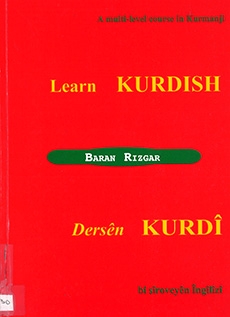|
INTRODUCTION
After publishing Dersên Kurdî and Kurdish-English, English-Kurdish Dictionary in 1993, I received many requests for a similar Kurdish text book written in English. This book which is a follow up to my earlier works is also a response to those requests.
The course is based on “Dersên Kurd!” and the text that I have written and used for my lectures in the Kurdish class in London for about 6 years. It is a multi-level course for adults and young adults who want to learn the Kurmanji dialect of Kurdish.
The Kurdish dialect of Northern Kurmanji is spoken by most Kurds in Northern Kurdistan (the Turkish part), all Kurds in the former Soviet Union and Syrian Kurdish areas, and some of the Kurds in the East and South of Kurdistan (the Iranian and Iraqi parts).
The lessons start with the Kurdish alphabet and teaches, revises and practices grammar step by step. They finally reach an upper intermediate level.
Each lesson start with a vocabulary (ferhengok) of about 20 words followed by the grammar dealt with in that section. As the way a language works is best shown by examples, vocabulary and grammar sections are followed by examples (sentences) which prepare the readers for dialogues, readings, folk stories and proverbs. Each lesson ends in exercises (hîndarî) which is a self-check review section.
Vocabulary sections include about 2,000 basic Kurdish words. Other sections are based on the vocabulary and grammar chosen for that lesson. They are planned to practice the vocabulary and the grammar.
Examples (sentences) show grammar in use. They have been translated into English to help the readers to understand them more easily. These are literal translations. Awkward English sentences resulting from this are expected to be overlooked. Where there is no equivalent English verbal form matching the Kurdish form (such as bilani) the interpretation is dependant on the context.
Dialogues, readings, Kurdish folk stories and proverbs give the readers a good idea of how the language works. They are mostly written in everyday Kurdish and help to practice Kurdish in common situations. Dialogues are translated into English at the end of the book.
Exercises (hîndarîs) provide a self-check review to help the readers revise what they have studied, test their knowledge and decide what they need to practice more. If the reader finds the exercises too difficult, they should return to examples and explanation for better preparation. There is a key to exercises at the end of the book, so that the readers can correct their answers to them. For best use do not refer to it before doing the exercises yourselves.
For the words having more than one spelling, I have used the one that is most common in written Kurdish.
Finally I hope that Dersên Kurdî will help to improve your Kurdish and give you a better understanding of the Kurdish people.
Baran Rizgar,
London, 1996
| 